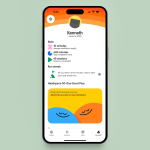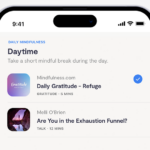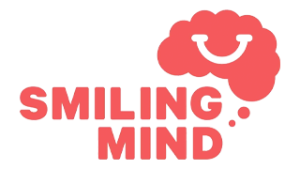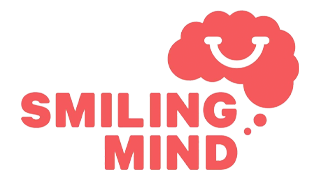Table of Contents
- We spent more than 10,000 hours researching over 70 online therapy platforms, mental health apps, and meditation apps. Our testers signed up for and tested the top 11 meditation apps.
- Our testers explore each app for at least four weeks, focusing on the sign-up process, the number and types of offerings, the quality of the offerings, and customer service interactions.
- To help us better understand this category, we surveyed dozens of meditation app users and consulted with multiple mental health experts.
Learn more about how we tested and chose the best meditation apps.
Key takeaways
- Headspace is our top pick for the best overall meditation app for its easy-to-navigate interface and expansive library of meditations.
- The meditation apps we recommend cost $0–$16.99 per month for unlimited use. Many also offer free trials of varying lengths.
- Through research, testing, surveys, and consultation with experts, we determined important factors to consider when choosing a meditation app, including pricing, functionality, variety of offerings, and expert involvement in the app’s creation.
Regular meditation practice can reduce stress and anxiety, improve your mood, and even boost your physical well-being. Getting started and sticking with it can be challenging, though. Smartphone-based meditation apps are one way to begin a meditation practice or, if you’re already practicing meditation, make it a consistent part of your daily routine.
To help you decide which meditation app may be right for you, we tested 11 of the most popular. Our top four picks got high marks for usability, quality content, and variety of offerings. Find out if a meditation app we recommend will work for you.
The best meditation apps of 2024
- Headspace: Best overall
- Calm: Best meditation app for sleep
- Mindfulness.com: Best meditation app for beginners
- Smiling Mind: Best free meditation app
Data privacy on meditation and mental health apps
In addition to understanding how your data is collected and used before signing up for an app, we recommend the following basic steps that we learned from the U.S. Department of Health and Human Services (HSS) and Mozilla Foundation *Privacy Not Included project:
- Use the app in a private location, preferably not on a public Wi-Fi network.
- Look out for checkboxes during sign-up to opt out of data tracking or medical information disclosure.
- Sign up with your email, not a social login like Facebook.
- Choose a strong password to create a secure account login.
- Review the app’s privacy guidelines to understand whether they share private information.
Headspace: Best overall
Why Headspace is our pick for the best overall meditation app
Headspace has an expansive collection of meditation and mindfulness resources unmatched by other apps we’ve tested. The app’s “Today” section curates resources you can choose from throughout the day, including breathing exercises, guided meditations, lessons, calming videos, and sleepcasts. You can also track the number of meditations you’ve completed and how many minutes you’ve spent meditating.
Who may want to use Headspace: For people looking to build mindfulness and meditation into their daily lives, Headspace is a great choice. The app goes beyond just meditation to help users incorporate mindfulness into every part of their lives, from exercise to sleep.
Who may not want to use Headspace: If you’re looking for a streamlined, simple app focusing solely on meditation, Headspace may not be right for you. The app’s breadth of content could be overwhelming to some.
Headspace tester insights
The Headspace app includes a huge variety of guided meditations and lots of other content, too. The offerings are divided into five main focus areas: meditation, sleep, movement, focus, and wake-up. To help you navigate the content volume, the app’s “Today” section curates a list of content you can choose from throughout the day. Here’s what our tester’s “Today” section included on their first day using the app:
- Morning: Four videos, including a one-minute deep breathing exercise, a “wake-up video” about salmon migration with a calming narrator, a meditation titled “Present-Moment Awareness,” and a short course on meditation basics.
- Afternoon: One sixty-minute “Bounce Back” audio session the app describes as “a blend of piano melodies and nature sounds to elevate your focus.”
- Evening: One 45-minute sleepcast titled “Downriver.”
Headspace’s short course on meditation basics is helpful for someone new to the practice. We also appreciate the Headspace website’s free Meditation 101 resource, which offers advice on starting your practice and answers to common questions about meditation.
One of our testers likes that their “Today” section changes daily but appreciates that each day starts with a short breathing exercise, and all testers note that the guided meditations are the most valuable part of the app. They like the variety of meditation, the ability to return to favorites and choose the narrator, and the meditation-tracking feature, which shows how many meditations you’ve completed and other stats.
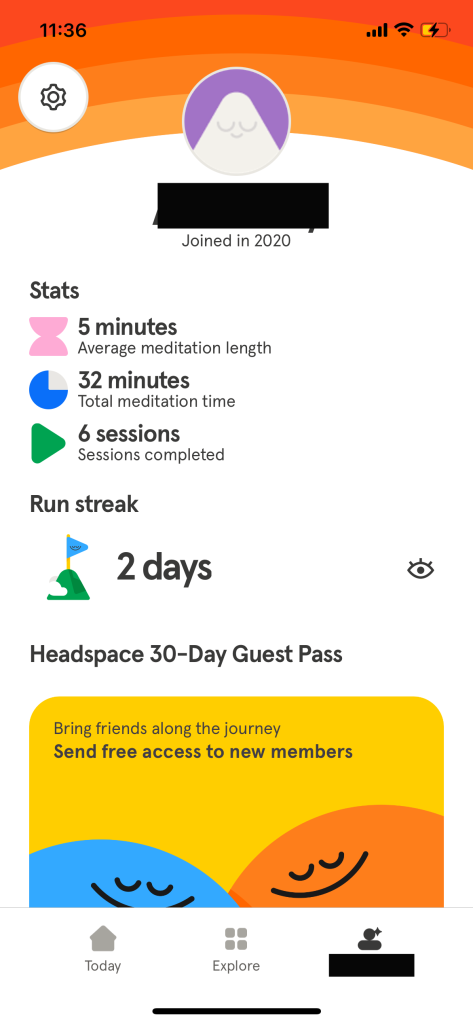
Beyond the meditations, our testers enjoy the yoga and movement videos, which range from seven to 45 minutes and don’t require any equipment. Testers are lukewarm on the app’s Wake-Up videos, which include visuals and narrations on topics like wildlife and the daily tasks of a bookbinder. One tester compares watching the Wake-Up videos to watching the Nature Channel or Our Planet, citing their calming effect.
Finally, we love that Headspace has options for the entire family, as meditation may be helpful for anxiety in children and teens. A review published by the American Academy of Pediatrics suggests that sitting meditation can be an effective intervention for youth experiencing psychosocial and behavioral conditions. If you want to introduce meditation to your family using a meditation app, Headspace has a family plan (for up to six accounts) and is free for U.S. teens ages 13–18.
From one of our Headspace testers:
“I really liked Headspace’s guided meditations as they helped me to have something to focus on while meditating and offered a series where I could progressively lengthen my time meditating. I felt like it was a great help to support a newer meditation practice or to help ease back into a meditation practice.”
Read our in-depth Headspace review for more information.
Calm: Best meditation app for sleep
Why Calm is our pick for the best meditation app for sleep
Like Headspace, Calm offers a good variety of guided meditations, but it stands out for its sleep content. Our testers tried the app’s sleep soundscapes, sleep stories (for adults and children), and bedtime visualizations. As one tester shares, “They have so much content for sleep that anyone who struggles to fall asleep like I do would likely find something that can help them.”
Who may want to use Calm: For people looking to improve the overall quality of their sleep, Calm is a great choice. In addition to guided meditations, which can relax and reset you throughout the day, the app’s sleep content is rich and varied, ideal for people working on sleep hygiene.
Who may not want to use Calm: If you’re not interested in sleep content and want to find a meditation app specifically to start or maintain a regular meditation practice, the Headspace or Mindfulness.com apps may be a better choice.
Calm tester insights
While we love Calm for its excellent sleep content, we also appreciate its variety of offerings. As one of our testers says, “It really does feel like a one-stop-shop for anything that could help you relax or feel less stressed.” The app’s primary offerings include the following:
- Meditations: Guided meditations of varying lengths are divided into categories like inner peace, relationships, or personal growth. You can also choose meditations with “less guidance” or find guided meditations for children.
- Movement: Slow-paced, low-impact movement videos focus on mindful movement and stretching. Most are short (five to 10 minutes).
- Sleep: This is the most varied category, with narrated stories to help you fall asleep, sleep sounds (some simulate nature sounds, like summer rain, and others are piano music or ambient sound), and bedtime visualizations.
All of Calm’s content can be personalized by using the app’s mood tracker. The app will ask you how you’re feeling (with options like “calm,” “sad,” or “anxious”) and offer stories or meditations to match your mood. “It’s a great way to keep a user from feeling overwhelmed by the large quantity of videos to choose from,” our tester says. You can also use the app’s “Discover” tab to search for specific types of content. This section is neatly organized into separate categories.
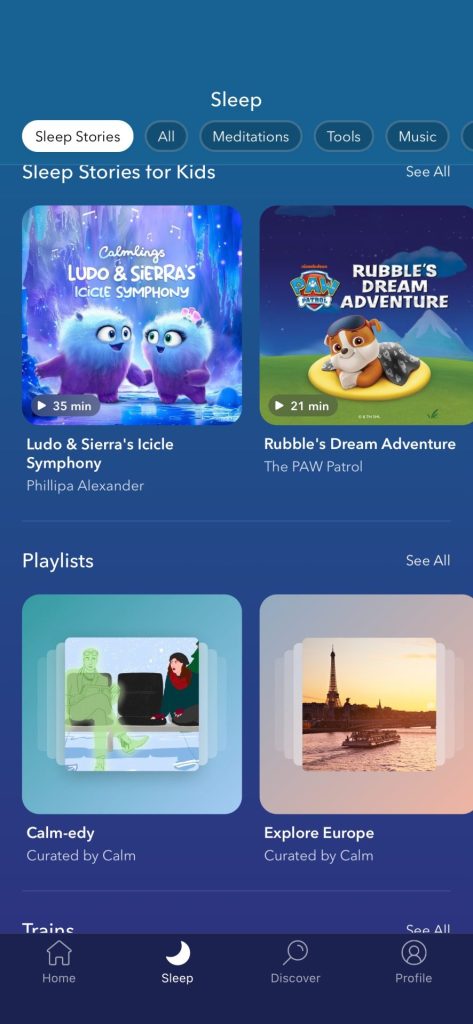
The National Center for Complementary and Integrative Health reports that mindfulness and meditation can improve sleep more than education-based sleep treatments. However, mindfulness meditation approaches were no more or less helpful than exercise or cognitive behavioral therapy (CBT) for sleep. People seeking improved sleep quality can use the Calm app to practice meditation, which may be helpful on its own, and also access tools specifically designed to promote sleep, such as soothing sounds, bedtime stories, and sleep-focused visualizations. Still, users may need to try a few categories of sleep content to find the right fit. For example, sleep stories keep our tester awake, but they find the app’s sleep music “incredibly relaxing.”
From one of our Calm testers:
“I absolutely love the sleep sounds—a large collection of sleep music without narrators. I find these to be so pleasing when I am trying to fall asleep. My favorite one is the summer rain mix, as I’m a huge fan of that noise. There are other categories, too, like piano music, ambient sounds, and even bilateral stimulation (EMDR).”
Read more in our Calm app review.
Mindfulness.com: Best meditation app for beginners
Why Mindfulness is our pick for the best meditation app for beginners
Of all the meditation apps we reviewed, the Mindfulness app has the best setup for beginners. The meditation library is large but not overwhelming, and the daily content in the “For You” tab is curated according to your responses to daily mood check-ins. There’s also an entire section dedicated to beginners, with short guided meditations that help teach meditation basics.
Who may want to use Mindfulness.com: If you want to start meditating but don’t know how or where to start, the Mindfulness.com app has easy-to-follow daily programs to help you achieve greater mindfulness.
Who may not want to use Mindfulness.com: We think Mindfulness.com is a great app for both beginners and experienced meditators, but if you don’t want themed meditations or podcasts, choose a more streamlined app, like Calm. Also, most guided meditations in this app are narrated by the same two people, so choose another app if you want more variation in narrators.
Mindfulness.com tester insights
New to meditating? Before you even download the Mindfulness.com app, you can visit the website’s “Meditation” tab for a free introduction to the practice. The Headspace website offers similar content for beginners, but the Mindfulness.com introduction to meditation is more robust, with several free meditations. You have to enter an email address to access this free beginner content, but we like that it doesn’t require you to set up an account or even start your free trial.
If you sign up for a Mindfulness.com account, you can access many more beginner-level mediations. The beginner meditations offer guidance on how to focus on your breath and tame thoughts during meditation. Each day, you’ll be prompted to share your mood by selecting from a list of emoticons with options like “sad,” “overwhelmed,” “grateful,” or “anxious.” If none apply, you can skip the emoticons and type in a few words to describe your mood, a feature our testers like. You’ll then have a dashboard of daily meditations and activities curated for your experience level and mood. These live in the “For You” tab on the app.
It’s worth noting that almost all of the guided meditations on this app are led by two teachers: Mellie O’Brien and Cory Muscara. While our testers enjoy the guided meditations, people who want more variety might be frustrated by this aspect of the app. You can also hear from other teachers on the Mindfulness.com app by heading to the “Radio” section, which includes podcasts and talks from world-renowned meditation and mindfulness teachers like Tara Brach and Shamash Alidina.
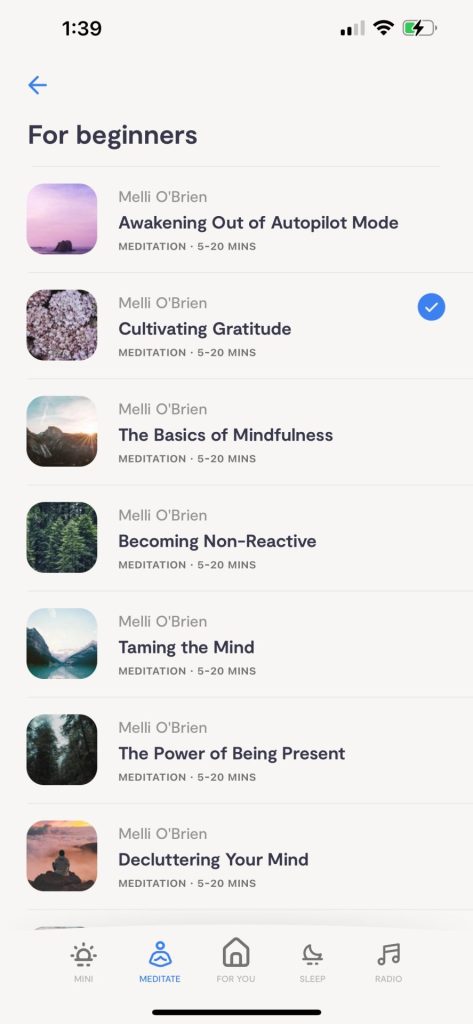
In addition to the “For You” tab, the Mindfulness app has the following sections:
- Mini: Very short practices for when you’re short on time.
- Meditate: If you don’t find something you like in your daily agenda, visit this tab to search for meditations by topic or teacher. More advanced practitioners can also visit this section for simple timers without added guidance.
- Sleep: Relaxation practices, including meditations, to promote more restful sleep.
- Radio: Our testers have good things to say about this section, which includes podcasts, playlists, and themed mixes. One tester writes, “Today, I listened to a really powerful podcast on listening by meditation teacher Tara Brach. Really illuminating. The app’s podcasts are well-curated for mindfulness-related topics, and all the speakers are great.”
Our testers also like the “Program” section of the Mindfulness app, found within the “Mediate” tab. Here, you can find courses and masterclasses on a variety of mindfulness-related topics, including the following:
- The Healing Power of Self-Compassion.
- Mindful Eating.
- Emotional Resilience in Adversity.
- Yoga Nidra Essentials.
From one of our Mindfulness.com testers:
“Each day, I’m given as many as six or seven meditations or activities. I like that there’s a variety and that I can do some of them when I’m out walking the dog (like the podcasts) while others require more stillness.”
Smiling Mind: Best free meditation app
Why Smiling Mind is our pick for the best free meditation app
We love that Smiling Mind provides high-quality meditation content and mindfulness education to people of all ages free of charge. Though this app doesn’t have many bells and whistles, this is not a case of “you get what you pay for.” Rather, this free app offers dozens of great ways to explore meditation and mindfulness tools, all developed by psychologists and educators.
Who may want to use Smiling Mind: This app is great for anyone on a budget who wants to set up a daily meditation practice for themselves, their kids, or their students.
Who may not want to use Smiling Mind: If you want a meditation app with lots of options—like sleep stories, podcasts, articles, games, and other interactive elements—Smiling Mind may be too simple for your needs.
Smiling Mind tester insights
We like the simplicity of this app, especially for someone who is short on time. There’s no need to sift through a lot of bonus content. Instead, the content is neatly organized by age group or type of user, with the following options: adults, kids, youth, families, and educators. Simply choose the category you want and get started.
Inside each category, you’ll see programs specific to that age group. For example, the kid’s content includes programs for babies, toddlers, and elementary school kids. There are also programs dedicated to specific topics, such as “Mindfully Back to School.” Our tester likes the content’s quality and specificity for children. We’re also impressed by the family content, a feature we didn’t see in other meditation apps. Here, families with children can find stories, games, and meditations to help each other see different points of view, build confidence, and build relationships.
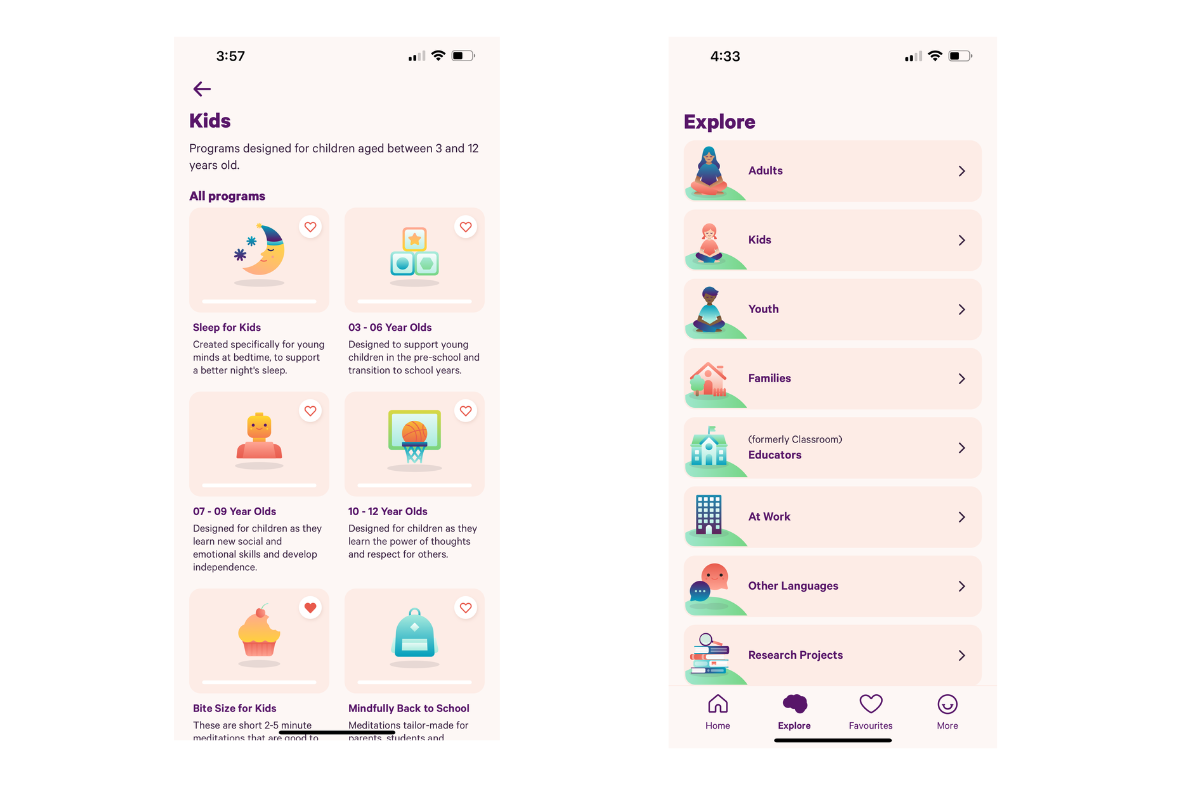
Another unique feature of the Smiling Mind app is its focus on educators. Studies have shown that mindfulness intervention in school settings can increase resilience and decrease anxiety in preschool, elementary, and high school students. Smiling Mind offers a free and easy way for teachers to introduce mindfulness to their students, with mini-curriculums organized by grade level.
Finally, while sleep content is not a major focus of the Smiling Mind app, it does include a sleep program for each age group, such as “Sleep for Teens.” Each sleep program includes four to six sleep meditations ranging from five to 15 minutes in length.
From one of our Smiling Mind testers:
“The meditations and videos for kids are great, and I really like the ‘Snow Globe’ metaphor for helping my youngest child understand how to work through challenging emotions. There’s a program for educators, too—I want to share this with my child’s teacher!”
Another meditation app to consider
The Happify app is unique because it incorporates games, articles, and challenges—including guided meditations—to help users conquer negative thoughts and thrive in specific life situations. Though the app can feel a little outdated, we like that it offers a lot of unique content.
- Cost: $14.95 per month.
- Available format: Guided meditations, science-based activities, and games.
- Standout feature: Focused tracks to help you develop well-being skills for specific life situations.
- Free trial: No.
Happify uses “tracks,” or programs, to help users develop skills for specific life situations. Examples of tracks include “Conquer Negative Thoughts,” “Find Balance After Work Burnout,” and “Calm Your Mind in Challenging Times.” Each track has four parts guiding you through games and activities related to the topic. According to the website, “If you come to Happify a couple times a week, it will take approximately one month to complete all four parts of your track.”
Happify is similar to Noom Mood, a mental health app that uses science-backed games and activities to help reduce stress and anxiety. Unlike Noom Mood, though, Happify also offers meditation instruction. For our tester, using Happify sometimes felt like a chore. The activities and games felt clunky and not very engaging, and the app itself feels outdated. Still, we’re including Happify in our round-up of best meditation apps because our tester enjoys the variety and length of the app’s guided meditations.
From one of our Happify testers:
“I was looking forward to using the app, but I don’t think it was the most engaging or impactful. I liked the guided meditations and used them frequently before bed. I found myself looking forward to meditation the most.”
How we test and choose the best meditation apps
The Handbook team researched over 70 online mental health platforms, including online therapy and psychiatry platforms, mental health apps, and meditation apps. Based on our research, we signed up for the top 11 meditation apps to test out for ourselves.






First-hand testing experience
Our testers explored the meditation apps and used its features for at least four weeks. Our testers are instructed to test the platforms through the lens of a real user, paying attention to how easy or difficult the app is to use. We ask testers to use as many aspects of the app as possible, including engaging in guided meditations, trying mindfulness and breathing exercises, playing games, and reading articles and essays. Testers log their experience in a diary and come together to share their findings when testing concludes.
Meditation app survey
We conducted a small anonymous survey of meditation app users, asking which apps they use, why they started using them, and how they benefit their lives. Hearing from real meditation app users also gave us insight into how people use these apps in their daily lives. For example, better sleep and greater mental clarity were two benefits of meditation apps cited by survey respondents.
From one of our meditation app survey respondents:
“Meditation apps got me to meditate more regularly…and provided useful coaching on how to meditate. They also kept track of my meditations and showed me how many hours I had meditated, which kept me motivated.”
From one of our meditation app survey respondents:
“Using a meditation app helped me with my goal of intentionally developing a meditation practice. In an intense time of stress, I was recommended to meditate, and the meditation app helped give me structure and guidance to build my practice. My meditation app also exposed me to other meditative practices, skills, and supportive activities that helped make my meditation practice more engaging.”
Mental health experts
A group of seasoned mental health professionals offered insight on meditation apps for this article, helping us ensure that our recommendations align with best practices for mental health care.
From one of our experts:
“I recommend meditation apps to my clients often. Many of my clients want to meditate more regularly but feel overwhelmed by the idea of starting a meditation practice on their own. Meditation apps that offer guided meditation sessions are an easy way for people to begin integrating meditation into their daily routines.” – Halle Thomas, LPC.
Our meditation app testing process
In a mental health emergency:
Mental health apps are not the most appropriate resource to help in a mental health crisis. If you or someone you know is a danger to themselves or others around them, it’s an emergency that can’t wait.
You can find help immediately by:
- Calling 911.
- Visiting an emergency room.
- Visiting urgent care.
- Calling or texting 988 for the Suicide & Crisis Lifeline.
- Chatting online at 988lifeline.org.
- Calling the Substance Abuse and Mental Health Services Administration (SAMHSA) Helpline at 1-800-662-4357 or texting your zip code to 435748.
- Calling the National Sexual Assault Hotline at 1-800-656-4673 or chatting online.
All the above options will connect you with trained professionals who can provide crisis support. You can find even more resources, including international options, on our helpline directory page.
How to choose the best mental health app for you
To choose the right meditation app, consider the following factors:
- Your goals: If you want to start a meditation practice from scratch, try a meditation app with lots of content for beginners, like Mindfulness.com or Headspace. If your goal is to improve your sleep, try an app like Calm, with lots of sleep-related content.
- Your budget: All the apps we reviewed are relatively affordable at less than $20 per month. Still, if you’re budget-conscious and on the fence about whether a meditation app will work for you, start with a free app like Smiling Mind.
- Accessibility: Some apps have accessibility features like closed captions, and some have content in different languages. Headspace has language options for English, French, German, Spanish, and Portuguese. Smiling Mind has meditations available in Arabic, Dari, and Kriol.
- User-friendliness: If you want a wide variety of mindfulness content, choose an app like Headspace. For a more streamlined, focused experience, consider Happify or Smiling Mind.
Meditation apps and relaxation techniques may be useful to manage symptoms of anxiety, depression, and stress, but the experts we spoke to agree that apps are not a replacement for therapy. If you’re struggling with a mental health condition, visit an in-person therapist or psychiatrist or explore options for online therapy and online psychiatry.
What are the benefits of meditation apps?
The benefits of mindfulness and meditation include lower stress levels, improved mental health, and greater happiness and fulfillment. Still, the busy pace of modern life that makes meditation so attractive can also make building a regular meditation practice hard. For some people, meditation apps can make it easier to build mindfulness into their daily routine. We talked to a few mental health experts who recommend meditation apps to their clients. According to those experts, here are the primary benefits of meditation apps:
Accessibility
Meditation apps make it possible to try meditation from the comfort of your home rather than attending an in-person class or hiring a teacher. “Apps like Headspace and Calm have user-friendly interfaces that demystify meditation, making it approachable even for those new to mindfulness,” says licensed marriage and family therapist Suzette Bray.
Accountability
Some apps have accountability features, such as alerts to remind you to meditate, stats to track how often you meditate, and community forums to get peer support. “These apps provide structured programs that can help users gradually build their meditation practice, offering guidance and support along the way,” says licensed clinical mental health counselor associate Elyese Wagner. “This can be particularly helpful for beginners who may feel unsure about where to start.”
Variety
“Apps like Headspace and Calm offer a wide range of meditation types and durations, catering to different preferences and needs,” says Wagner. “This variety helps users find practices that resonate with them.” The meditation apps we recommend also have content beyond meditation, such as sleep casts and inspirational talks from experts.
From one of our meditation app survey respondents:
“I found I had a much easier time letting things go since the app taught me how to recognize and acknowledge thoughts and feelings without letting them take over. I also became much better at learning to calm my thoughts and anxiety during particularly stressful times.”
Our final verdict
Our overall pick for the best meditation app is Headspace because of its extensive library of guided meditation and mindfulness resources. We love that this app tracks your meditation stats and offers a curated selection of daily meditations. For people seeking to improve their sleep, we recommend the Calm app. For beginners, we think the Mindfulness.com app is a great choice. Finally, we recommend Smiling Mind if you’re looking for a simple but effective meditation app that’s 100 percent free.
The apps we recommend offer various guided meditations with varying narrators, lengths, and topics. These apps also include other types of content, from relaxing playlists to soothing sleep stories and mindfulness exercises for children and teens. Many apps also offer daily reminders or tracking features to help you stay committed to your practice.
While meditation apps shouldn’t be considered a replacement for therapy, they offer an affordable, accessible means of starting or maintaining a meditation practice from home.
Compare the best meditation apps of 2024
| Our take | Best overall | Best for sleep | Best for beginners | Best free app |
| Monthly cost | $12.99 | $14.99 | $16.99 | $0 |
| Free trial | Yes | Yes | Yes | N/A |
| Works with | iOS and Android | iOS and Android | iOS and Android | iOS and Android |
Frequently asked questions
Headspace and Calm both offer hundreds of guided meditations and additional mindfulness features, like breathing exercises, movement videos, and content to help you sleep better. The app you choose depends on your specific preferences.
The best meditation app will vary according to individual needs and preferences. We recommend Headspace as the best overall meditation app, but other apps—like Calm or Mindfulness.com—also offer users the benefits of exploring mindfulness from home.
Most meditation apps have a monthly fee below $20, but some are 100 percent free. Smiling Mind is free for all users, and Headspace is free for all U.S. teens ages 13–18.
- Rights, O. F. C. (2023, October 17). Telehealth privacy and security tips for patients. HHS.gov. Link
- Black, D. S., Milam, J., & Sussman, S. (2009). Sitting-Meditation Interventions among Youth: A Review of Treatment Efficacy. Pediatrics, 124(3), e532–e541. Link
- Meditation and mindfulness: What you need to know. (n.d.). NCCIH. Link
- Phan, M. L., Renshaw, T. L., Caramanico, J., Greeson, J. M., MacKenzie, E., Atkinson-Diaz, Z., Doppelt, N., Tai, H., Mandell, D. S., & Nuske, H. J. (2022). Mindfulness-Based School Interventions: a Systematic Review of Outcome Evidence Quality by Study Design. Mindfulness, 13(7), 1591–1613. Link





